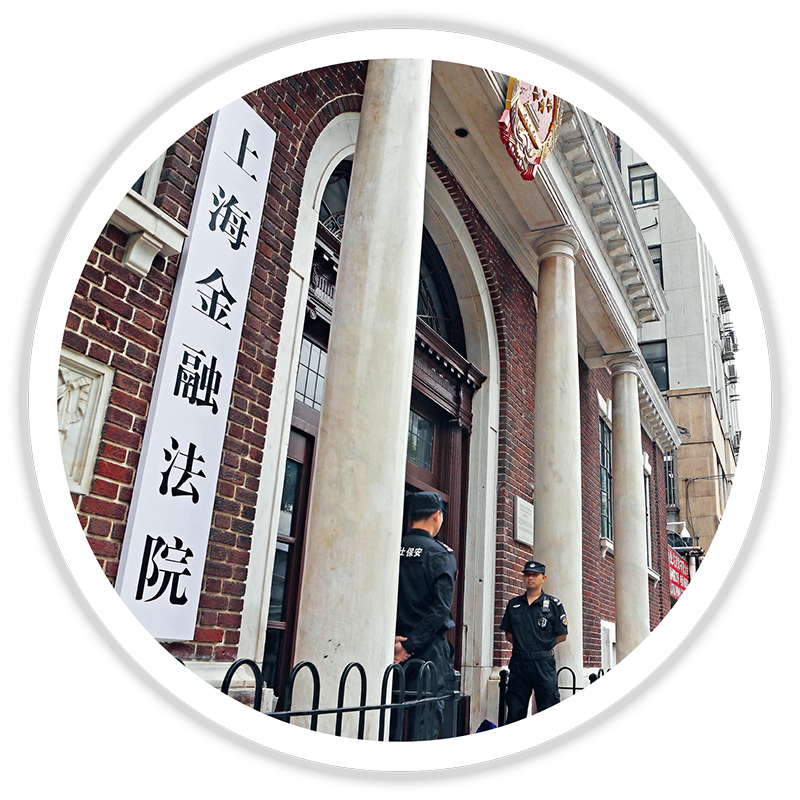Today we will take a look at the two annual reports from Shanghai Higher People's Court and Shanghai People's Procuratorate. How many criminal, civil and financial cases have they dealt with in the past year? How many corrupt officials have been caught? Let’s find out!
In 2018, all of Shanghai's courts together dealt with 798,000 cases, 99.5% — or 794,000 cases — of which have concluded. Each judge dealt with 265 cases on average.

These cases like eight types, including murder, robbery, kidnapping, drug trafficking and arson.

Such cases included blackmail, unlawful detention and casino operation.

Bribery, embezzlement and dereliction of duty were among the corruption cases dealt with. A total of 246 people were sentenced, 7 of whom were bureau-level officials or above.
*The courts also dealt with 175 food safety cases and 32 illegal loan shark cases.
Free trade zone related
Foreign individuals or entities involved

Bankruptcy and liquidation
Intellectual property right related

On August 20 last year, Shanghai opened China's first court specializing in financial cases, Shanghai Financial Court, as the city strives to become a global financial center. By year's end, it had dealt with 1,897 cases, with a total contract value of 25.2 billion yuan.

In this section, our reporters interviewed some pedestrians on Shanghai's streets and asked what issues they are concerned most about regarding the city. Let's see what they said.
Daily expenses in Shanghai are really high. Although young people like me have decent jobs, we still live with tightened belts due to expensive home rental fees, among other things. The feeling of having debt or even just having no savings is not nice at all. I hope the prices in Shanghai, especially housing prices, can be lowered. One day I’d love to be able to afford to rent an apartment alone.

I do hope home prices in Shanghai can be more affordable in the future so that young people don't have to go to remote areas just to get a roof over their heads. Frankly speaking, spending a lot on my own apartment and commuting on top of that has definitely put me under great pressure. Also, it will be good if more sports games and cultural and entertainment events could be staged in the city.

I wish there could be more interesting books for students in public libraries. I like spending time in the neighborhood library — it offers a quiet space and some of the books are really good, like novels and biographies. I expect more books of such quality. Besides, some books are poorly preserved, with covers missing or ripped pages. I wish people would take better care of books.

Given the geographical distance between my university (in Songjiang District) and the city center, it usually takes me more than two hours to travel back and forth. Although there is a Metro line directly to my university, I think it might be better for the Metro to skip a few stations to shorten the travel time.

I live with my husband and my child lives far away from us. It is getting hard for me to go out because I am getting older. I am afraid that I may get seriously ill someday and not be able to afford proper care. The good thing is that I am in good physical condition now. I hope that the government can be more supportive in terms of medical insurance.


Moral lessons won't be as effective as heavier punishments for pet owners who fail to properly raise their pets for the safety of other people. Punishments should be raised to get the attention of rule-dismissing pet owners, and the regulations should include more criminal instances.

The hotel industry has become an important part of tourism service and hygiene is one of the basics that a hotel should provide. The city should take the lead in legislating on higher hygiene standards and more effective punishment measures for unsatisfactory hotel services.

A preferential real estate property loan rate should be offered for young professionals working in science and technology as top professionals are indispensable in helping the city increase its competitiveness. Currently in Shanghai, those who purchase their first apartments are required to make a down payment of at least 35 percent, which makes it impossible for many young professionals to settle in the city, even a few years into working here.